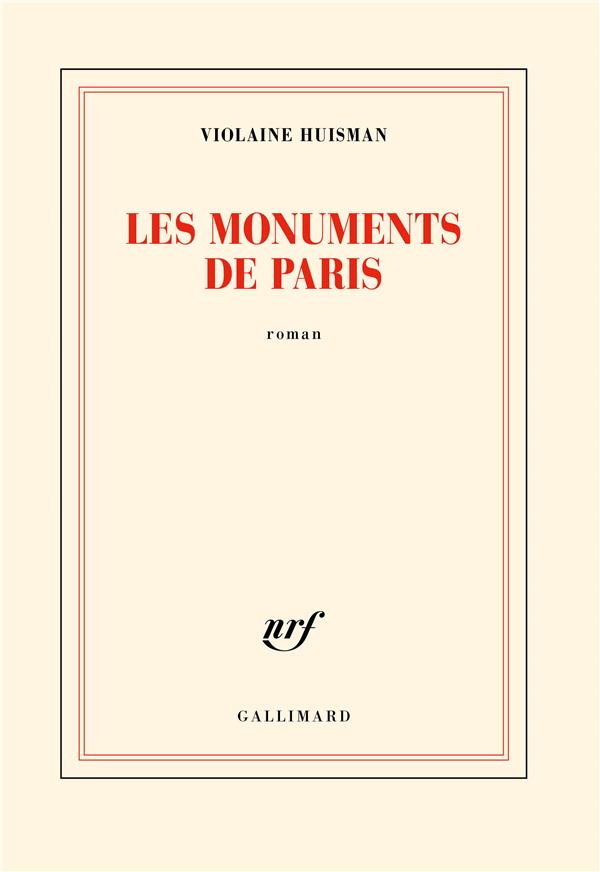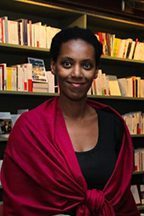Les Monuments de Paris by Violaine Huisman

In her previous highly praised novels Rose Désert (Gallimard) and The Book of Mother* (Scribner, translated from the French by Leslie Camhi), Violaine Huisman revisited the life of her dashingly beautiful mother, Catherine Cremnitz, whose all-consuming love and volcanic moods had informed her childhood and womanhood.
This time, her father, Denis Huisman, is the centerpiece of her latest novel, Les Monuments de Paris, just published in France by Gallimard. A visionary author and editor of philosophy with an exceptional knack for business, Denis Huisman was a relentless lover of women (he married four times and fathered 8 children), and indulged in lavish displays of wealth and extravagant lifestyles.
With the rigor, lucidity, and intelligence that she demonstrated in her previous books, Violaine delves into family and official archives to better make sense of this man, described in his obituary as “an iconoclast, an unclassifiable, flamboyant, Balzacian character.” As Violaine digs into the past, a second figure emerges from her narrative, that of Denis’s father, Georges Huisman, historian, archivist, graduate of the prestigious Ecole Nationale des Chartes, senior civil servant, general secretary of L’Elysée, Director of Fine Arts under Prime Minister Jean Zay, and creator and founder of the Festival de Cannes.
Violaine zooms in on the details, and stands as close as possible to the raw material of her character’s daily lives, at a level where she can see everything and anything. Her writing embraces the perspective of the archivist, of reality, with the intent to make visible again what once was. At times, she finds out that the archives corroborate her father’s accounts, at others, she lets the narrative generously lurch on the side of fiction, especially when Choute de Troguindy, her grandfather’s mistress, takes the stage. And it is maybe this singular mix of archives, memories, and pure fiction — and Violaine’s dexterity in weaving them together — that gives Les Monuments de Paris its remarkable grace, depth and its very own musicality.
Both Denis and Georges Huisman belonged to an era where gender equality was certainly not a priority, and we feel very deeply how their actions may have hurt their relatives, including the author herself. As she reflects on her father’s (and grandfather’s) successes and fault lines,Violaine Huisman reveals how the wrath of history interferes with their existences, existences to which she ultimately builds a radiant, lucid, at times humorous– at others, harrowing — mausoleum.
As we close her novel, the words of the Palestinian poet Adania Shabli come to mind:
‘L’intérêt de la littérature n’est pas d’inciter au changement, mais à l’intimité, à la réflexion, de ramener les autres à nous-mêmes ; peut-être un espace pour considérer comment se relier à nous-mêmes et aux autres, dans la vie comme dans la douleur ; pour nous guider vers un mieux-vivre () «pour rendre l’inconnu meilleur».’
‘The point of literature is not to incite change, but to make possible a certain quality of intimacy, of reflection, to bring back the others to us: [to make possible] a space where we can envision how to connect to our selves and to others, in life as in pain: to guide us towards a better-living () “to make the unkown better”.’
Les Monuments de Paris, A novel by Vioalaine Huisman, Gallimard.
* Fugitive parce Reine, Violaine Huisman’s debut novel, Folio/Gallimard
Click here to purchase this book with us.
To go further
Un père peut en cacher un autre, avec Violaine Huisman
Aujourd’hui le Book Club reçoit l’écrivaine Violaine Huisman. Dans son roman “Les monuments de Paris”, elle s’intéresse à la lignée masculine de sa famille. Derrière la flamboyante figure du père, se dessine celle du grand-père, Georges Huisman, et avec lui tout un pan de l’Histoire française.
Les généalogies familiale et littéraire de Violaine Huisman
” Les Monuments de Paris “, nouveau roman de l’écrivaine, clôt un triptyque dont la filiation est le thème central. Après sa mère, c’est ses père et grand-père qu’elle rappelle à notre souvenir.


